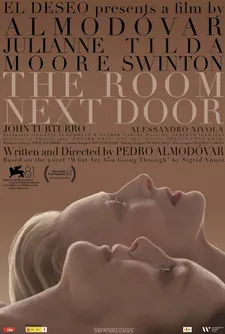Pedro Almodóvar’s free and fabulous adaptation of the novel What Are You Going Through by Sigrid Nunez is his first feature in English and a celebration of life’s miraculousness face-to-face with death. The duo of Julianne Moore and Tilda Swinton display an inner and outer beauty that lifts a tale of dying into an unforeseen realm, where friendship and care and appreciation of the world reign.
 |
| Pedro Almodóvar holding up What Are You Going Through by Sigrid Nunez Photo: Anne Katrin Titze |
The Room Next Door (Golden Lion winner at the Venice International Film Festival and Centerpiece Gala selection of the 62nd New York Film Festival) has a terrific supporting cast of John Turturro, Alex Høgh Andersen, Sarah Pidgeon, and Alessandro Nivola and is packed not only with spectacular shots of nature and New York City, humans und human-made things, it weaves in the power of other works of art organically and meticulously.
In the second instalment with author Sigrid Nunez, we speak about the differences between The Room Next Door and Scott McGehee and David Siegel’s The Friend (based on her National Book Award-winning novel) and how in both cases the directors fleshed out the character of a daughter, who was only briefly mentioned in each book. Plus Alessandro Nivola’s performance in Brady Corbet’s The Brutalist and as the police officer in The Room Next Door.
From New York City, Sigrid Nunez joined me on Zoom for an in-depth conversation on the film adaptations of two of her novels, The Friend and What are You Going Through on the last day of the New York Film Festival
Anne-Katrin Titze: I’d like to ask you about a point in the Almodóvar film that touched me very much, and that was Tilda's speech about motherhood. She [as Martha] is talking about her relationship to her child, and how she could have been a changeling more or less. What did you think of that?
Sigrid Nunez: Very painful, because I remember when I have her say that to the narrator [in the novel], the narrator says how it chilled her to hear that. You know she's listening. She might be somewhat empathetic, sympathetic, but it doesn't sit well with her. It wouldn’t with anybody, really. I guess I just know so many people where the parent and child relationship, where, for whatever reason, their own reasons, it should be great, mother, child, it should be wonderful, and sometimes it's very ugly, and it's tragic. It's heartbreaking. And so to me this was one of those situations where, because of certain misunderstandings, there's no relationship there. There's no affection there. I do see that.
 |
| Ingrid (Julianne Moore) with Martha (Tilda Swinton) in The Room Next Door |
And then, because she's a very frank, honest person, she says for her there's such a distance between them that she feels like this is not my flesh and blood. I feel like there was another child switched, but it isn't that. It's something that goes so wrong at an early age that it never is able to be repaired. And I've seen that. I suppose I've seen more happy parent-child relationships than miserable ones, but I do know of an awful lot of estrangement between parents and their children. It's never really okay. Usually it's never all on one side.
Interestingly enough, since I wrote this a long time ago, very recently, I don't know if you're aware of this, but there's this new movement in therapy, therapeutic circles, therapy circles, of advocating cutting off with your parents. It's just, it's too toxic. Don't even try it, save yourself. Throw your parents under a bus, save yourself. And certain professionals are saying, this is not a good idea. We don't believe this is the way to go, and others are saying it's extreme, but in some cases it's the best idea now. Who's to know except for the people involved? But I thought it was interesting, because that’s sort of what I was thinking about.
Like, usually you're told, well, you never leave your family. You have to try to make it work, and so on. And yet it doesn't work, just like sometimes with siblings, they are the worst enemies instead of being allies. They're like the worst, the worst enemies. We know about sibling rivalry. It's very common. It's famous, but I think there can be a kind of rivalry with the parents and the children, too, where suddenly there's this resentment. It's a smaller thing in my book than it is in the movie. But I remember when we met for the first time, which was two years before the film was made, or finished, from the very beginning he [Pedro] had this idea about making that role.
 |
| Attila (Alessandro Nivola) with László Tóth (Adrien Brody) in Brady Corbet’s The Brutalist |
He already had the name Michelle that he was going to add to what I'd written. He was going to make more of that because it really spoke to him. Somehow, that idea. And also, you know, it's interesting that these two movies [The Room Next Door and The Friend] are very different, but in both cases the directors took where I had only just mentioned that a daughter existed but didn't make her a character, in both cases, the movie directors said, I want the daughter to be a character!
And so you have Michelle in the Almodóvar, and you have Val [Sarah Pidgeon], Walter's [Bill Murray] daughter. She's just mentioned in a sentence or two in The Friend, so I thought that was interesting that they both saw, Oh, no, no, Sigrid, what about the daughter? And it works, it adds plenty to the movie.
AKT: Yes, it is fascinating, I mean, Almodóvar and mothers! He is the one always exploring motherhood and ghostliness. In a way, the mother's ghosts are everywhere, and also, I think, what he did wonderfully, and I don't want to give that away, but there was another scene, where I thought that the casting of Tilda, coming back, was beautiful. The ghost!
SN: Loved it. I loved it the first night that I saw it. I saw it at a screening room first with three people. But last Friday night [at the New York Film Festival premiere] when she appears, people in the audience laughed. I think they took it very seriously when the daughter appears, when Michelle appears, and they took it as kind of ironically, I think, or as satire or parody or something. I just mean, not a lot of people laugh. But there was laughter there, and I thought, why are they laughing? They were laughing because it was Tilda Swinton. I felt they weren't as deep in the story. It was odd, I did not think it was a point of humour in that film. There's other humour in that film, but not here.
 |
| The Room Next Door poster |
AKT: I didn't laugh. It felt like a haunting. A comment from The Friend sometimes comes back into my head while browsing, while going shopping. It is the argument by the nameless Walter character in your novel, that there's no female flâneur and that somehow shopping is the female equivalent.
SN: It's true, and it is also true that for the ideal flâneur, that is the point, you're supposed to not be paying attention to anything for it to be the real experience. And women do not have that. However, when you get old, you do. That's simply true. And I put that in the book, too. She just has to wait until she gets old enough, and then she's invisible. It's strange when that passes from your life. It's one of the advantages, one of the benefits of growing old.
AKT: You can be a flâneur!
SN: You can be a flâneuse! It's liberating. You don't have to think about how you look and how that is going to attract either bad attention or even good attention. Because that's a burden, too. I say to some of my young female friends, I say, when I think about how you'd go out, the hair, the makeup, the clothes, all the time that takes!
And it's a good thing. I don't want people to stop doing that if it makes you feel good. But when you get old you don't have that anymore. Well, some women do. It's just nobody's looking at you for that when you are a certain age. It's just gone, and if there's a painful part of that, there is a benefit, and this is, as I say, you feel much freer out there doing your thing.
AKT: Apropos, what did you think of Alessandro Nivola as the policeman?
SN: Oh, I thought he was very good. I saw him in The Brutalist.
AKT: So did I. Very good. Yes, I thought he was excellent.
 |
| New York Film Festival 62 posters Photo: Anne Katrin Titze |
SN: I thought he was very convincing. It's this small role, it’s just like Felix Solis in The Friend as the super. That's a small role, Hector, but it really got to me because I thought it was seamless, absolutely seamless. I thought it was perfect and I loved him in that film, Felix Solis. And the same thing with Alessandro Nivola. He's just very convincing as that type. And he's menacing in a very particular way.
AKT: Thank you so much for this!
SN: Thank you. It was a wonderful conversation.
Read what Sigrid Nunez had to say on David Siegel and Scott McGehee’s adaptation of her novel The Friend, Bing, and fairy tales.
The Room Next Door opens in the US on Friday, December 20.
The Brutalist opens in the US on Friday, December 20 and in the UK on Friday, January 24.











![Sigrid Nunez with Anne-Katrin Titze on Alessandro Nivola as the police officer in Pedro Almodóvar’s The Room Next Door: “He's just very convincing as that type. And he's menacing in a very particular way. I thought he was very good. I saw him in [Brady Corbet’s] The Brutalist.”](/images/newsite/Sigrid_Nunez_Anne-Katrin_Titze_1_600.webp)













